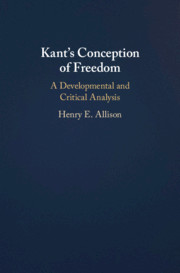Book contents
- Kant’s Conception of Freedom
- Kant’s Conception of Freedom
- Copyright page
- Dedication
- Contents
- Preface
- Acknowledgments
- Note on Sources and Key to Abbreviations and Translations
- 1 Kant’s Writings of the 1750s and the Place in Them of the Free Will Issue
- 2 Kant’s Theoretical Philosophy in the Early 1760s and Its Relation to His Conception of Freedom
- 3 Kant’s Moral Philosophy in the Early 1760s
- 4 Kant’s Dialogue with Rousseau Supplemented by His Dreams of a Spirit-Seer
- 5 From the “Great Light” to the “Silent Decade”: Kant’s Thoughts on Free Will 1769–1780
- 6 Kant’s Account of Free Will in the Critique of Pure Reason
- 7 From the Critique of Pure Reason to the Groundwork
- 8 The Fact of Reason and Freedom in the Critique of Practical Reason
- 9 The Critique of the Power of Judgment and the Transition from Nature to Freedom
- 10 Kant’s Final Thoughts on Free Will
- Bibliography
- Index
7 - From the Critique of Pure Reason to the Groundwork
Published online by Cambridge University Press: 19 December 2019
- Kant’s Conception of Freedom
- Kant’s Conception of Freedom
- Copyright page
- Dedication
- Contents
- Preface
- Acknowledgments
- Note on Sources and Key to Abbreviations and Translations
- 1 Kant’s Writings of the 1750s and the Place in Them of the Free Will Issue
- 2 Kant’s Theoretical Philosophy in the Early 1760s and Its Relation to His Conception of Freedom
- 3 Kant’s Moral Philosophy in the Early 1760s
- 4 Kant’s Dialogue with Rousseau Supplemented by His Dreams of a Spirit-Seer
- 5 From the “Great Light” to the “Silent Decade”: Kant’s Thoughts on Free Will 1769–1780
- 6 Kant’s Account of Free Will in the Critique of Pure Reason
- 7 From the Critique of Pure Reason to the Groundwork
- 8 The Fact of Reason and Freedom in the Critique of Practical Reason
- 9 The Critique of the Power of Judgment and the Transition from Nature to Freedom
- 10 Kant’s Final Thoughts on Free Will
- Bibliography
- Index
Summary
Kant’s initial major treatment of the free will problem after that in the first edition of Critique of Pure Reason was in the Groundwork for the Metaphysics of Morals (1785). It is marked by the introduction of the conception of the autonomy of the will, which is Kant’s attempt to provide a foundation for morality after his realization of the inadequacy of his position in the Canon, where it was provided by a rational faith based on the hope that happiness will be rewarded in proportion to the worthiness of it. As was noted, this appeal to hope was intended to provide an incentive or principium executionis for obeying the dictates of morality, with these dictates being themselves grounded in the moral law (the principium diiudicationis), which is a product of pure reason. And, as was also noted, it was precisely because the latter was located in pure reason that the principium executionis was regarded as problematic; for it raises the question of how pure reason, which, ex hypothesi, abstracts from any considerations of self-interest, could have a motivating power, particularly when its dictates conflict with the agent’s perceived self-interest. In Kant’s terms, this became the question: How can pure reason be practical, i.e., determine the power of choice? But while the central focus of this chapter will be on this thesis and its implications for both Kant’s account of freedom and the project of grounding the categorical imperative as principium diiudicationis as delineated in the Groundwork, in order to gain a fuller understanding of the development of Kant’s thought on these issues, it is necessary to preface the discussion with a brief consideration of two texts that stem from the period between the publication of the first edition of the Critique and the Groundwork, namely, Kant’s review of a work that attempted to provide a deterministic grounding for morality (1783) and the account of freedom in the transcription of the Metaphysic Mrongovius, which is a set of lectures dated between 1782 and 1783.
- Type
- Chapter
- Information
- Kant's Conception of FreedomA Developmental and Critical Analysis, pp. 299 - 349Publisher: Cambridge University PressPrint publication year: 2020



